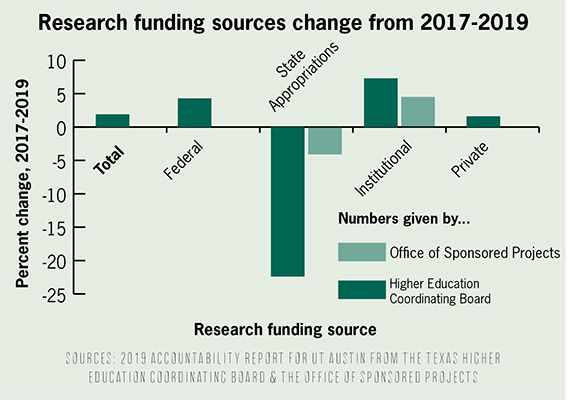Research fund amounts sent to the Texas Higher Education Coordinating Board for UT’s annual accountability report have been unintentionally “slightly distorted” over years to inaccurately show more significant changes in funding, according to the University’s Office of Sponsored Projects.
The board’s Accountability System compares and tracks the performances of higher education institutions annually, according to the board’s 60x30TX website. The institutional data collected by the board is used by state legislators and university boards in allocating funds and evaluating the success of higher education programs.
The UT fiscal year 2019 accountability report, which was published in May 2020, showed a 22.4% decrease from 2017 to 2019 in the distribution of state funds toward research spending.
Michael Howell, grants and contracts manager for the Office of Sponsored Projects, said he calculated the real percent change to be a 4.1% decrease in research spending with state funds.
“This issue was unforeseeable at the time we were preparing the (accountability) report,” Howell said. “We had to report the expenditure amounts to the best of our ability with the data at our disposal.”
The University pays several expenses to employees that are unrelated to their salaries, such as workers’ compensation and unemployment benefits. The misrepresentation of data, Howell said, is due to reporting the individual nonwage expenses under the “State Appropriations” category. Those expenditures are now reclassified under the “Federal” category, Howell said.
Linda Haster, the associate director of sponsored projects and award administration for the Office of Sponsored Projects, said the University has since shifted to reporting nonwage expenses with a pooled fringe methodology, reporting fixed rates for benefit packages per department instead of each individual employee.
“Converting to a pooled method allows institutions to recover a higher percentage of the cost while reducing the administrative burden related to establishing and managing the budgets,” Haster said.
Karl Fisher, the executive director of Applied Research Laboratories, said the lab is a University-affiliated research center contracted by the United States Department of Defense and 99% funded by federal funds.
“We act as effectively trusted agents for the government,” Fisher said. “We avoid real or perceived conflict of interest, and we do that primarily by not taking contracts directly from industry.”
Fisher said project funding is negotiated through the Office of Sponsored Projects with the government in an omnibus contract or grant. Changes of funding come from the adjustments of the Department of Defense’s budget over time.
“We do kind of track the government spending,” Fisher said. “Sometimes, though, (Applied Research Laboratories) tends to do even better when money is tight because we are pretty cost-effective.”
Haster said the office hasn’t seen any significant changes in federal funding due to the COVID-19 pandemic. The financial impact of the pandemic on research funding likely won’t be reflected in an accountability report until fiscal year 2021 or 2022, Haster said.
“We haven't seen a decrease in the proposal submissions that we've been applying for, and the awards that we've been getting granted,” Haster said. “If anything, there's a different sector that's become available because of all the research going around (COVID-19) in general.”
Editor’s note: The infographic associated with this story was updated to include the Office of Sponsored Projects as a source. The Texan regrets this error.





















